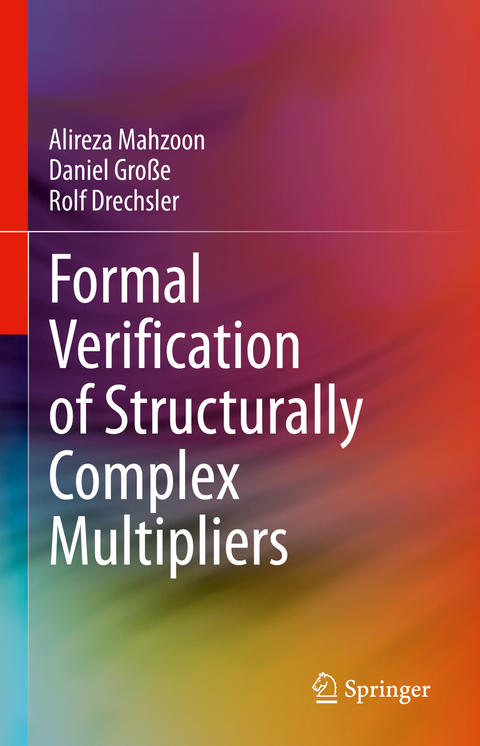
Formal Verification of Structurally Complex Multipliers
Springer International Publishing (Verlag)
978-3-031-24570-1 (ISBN)
This book addresses the challenging tasks of verifying and debugging structurally complex multipliers. In the area of verification, the authors first investigate the challenges of Symbolic Computer Algebra (SCA)-based verification, when it comes to proving the correctness of multipliers. They then describe three techniques to improve and extend SCA: vanishing monomials removal, reverse engineering, and dynamic backward rewriting. This enables readers to verify a wide variety of multipliers, including highly complex and optimized industrial benchmarks. The authors also describe a complete debugging flow, including bug localization and fixing, to find the location of bugs in structurally complex multipliers and make corrections.
Alireza Mahzoon received his Dr.-Ing. Degree in computer science from the University of Bremen in 2022. He remained as a Post-Doctoral Researcher with the Group of Computer Architecture, University of Bremen. In December 2022, he became a senior engineer at Infineon Technologies, Munich, Germany. He published several papers at international conferences and journals, such as DATE, ICCAD, DAC, and TCAD. His current research interests include formal verification and debugging of arithmetic circuits with a focus on highly complex and industrial multipliers. He received the best paper award at ICCAD 2018. Daniel Große received the Dr.-Ing. Degree in computer science from the University of Bremen in 2008. He remained as a Post-Doctoral Researcher with the Group of Computer Architecture, University of Bremen. In 2010, he was a substitute Professor for computer architecture with the University of Freiburg, Germany. From 2013 to 2014, he was the CEO of the EDA start-up solvertec focusing on automated debugging techniques. After that, until 2020, he was a Senior Researcher at the University of Bremen as well as Scientific Coordinator of the Graduate School System Design funded within the German Excellence Initiative. In addition, he has been working at the German Research Center for Artificial Intelligence (DFKI) since 2015. In July 2020, he became a full professor at the Johannes Kepler University Linz, Austria, where he is the head of the Institute for Complex Systems as well as the head of the “LIT Secure and Correct Systems Lab” (composing the expertise of over ten JKU institutes) since 2022. His current research interests include verification, virtual prototyping, debugging, synthesis and RISC-V. He published over 150 papers in peer-reviewed journals and conferences in the above areas. Dr. Große served in program committees of numerous conferences, including ASP-DAC, DAC, DATE, ICCAD, CODES+ISSS, GLSVLSI, FDL, ETS, and MEMOCODE and was the General Chair of FDL 2022. He received best paper awards (FDL 2007, DVCon Europe 2018, ICCAD 2018,FDL 2020 and FDL 2022) as well as business-related awards (IKT Innovativ Award 2013, Weconomy Award 2013, and Embedded Award 2014). He is an IEEE Senior Member and an Allied Member of the Accellera Systems Initiative in the SystemC Verification Working Group. Rolf Drechsler received the Diploma and Dr. phil. nat. degrees in computer science from the Johann Wolfgang Goethe University in Frankfurt am Main, Germany, in 1992 and 1995, respectively. He worked at the Institute of Computer Science, Albert-Ludwigs University, Freiburg im Breisgau, Germany, from 1995 to 2000, and at the Corporate Technology Department, Siemens AG, Munich, Germany, from 2000 to 2001. Since October 2001, Rolf Drechsler is Full Professor and Head of the Group of Computer Architecture, Institute of Computer Science, at the University of Bremen, Germany. In 2011, he additionally became the Director of the Cyber-Physical Systems Group at the German Research Center for Artificial Intelligence (DFKI) in Bremen. His current research interests include the development and design of data structures and algorithms with a focus on circuit and system design. He is an IEEE Fellow.
Introduction.- Background.- Challenges of SCA-based Verification.- Local Vanishing Monomials Removal.- Reverse Engineering.- Dynamic Backward Rewriting.- SCA-based Verifier RevSCA-2.0.- Debugging.- Conclusion and Outlook.
| Erscheinungsdatum | 17.02.2023 |
|---|---|
| Zusatzinfo | XIII, 130 p. 36 illus., 23 illus. in color. |
| Verlagsort | Cham |
| Sprache | englisch |
| Maße | 155 x 235 mm |
| Gewicht | 389 g |
| Themenwelt | Mathematik / Informatik ► Informatik ► Theorie / Studium |
| Informatik ► Weitere Themen ► Hardware | |
| Mathematik / Informatik ► Mathematik ► Angewandte Mathematik | |
| Technik ► Elektrotechnik / Energietechnik | |
| Schlagworte | Formal Verification of Arithmetic Circuits • Formal Verification of Multipliers • SCA-based Verification • Symbolic Computer Algebra • Verification of Complex Multipliers |
| ISBN-10 | 3-031-24570-9 / 3031245709 |
| ISBN-13 | 978-3-031-24570-1 / 9783031245701 |
| Zustand | Neuware |
| Informationen gemäß Produktsicherheitsverordnung (GPSR) | |
| Haben Sie eine Frage zum Produkt? |
aus dem Bereich


